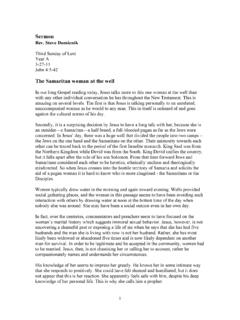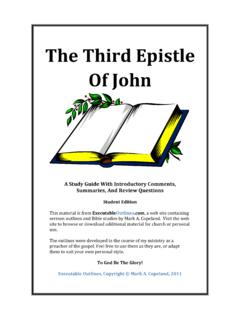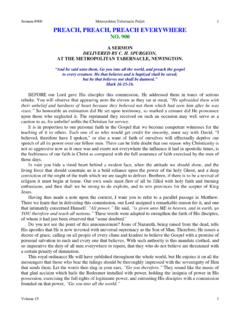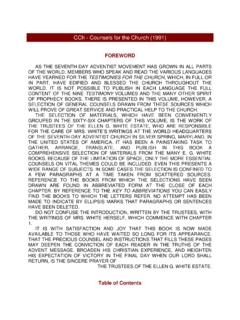Transcription of CULTIVATING A LIFE FOR GOD ULTIPLYING DISCIPLES …
1 CULTIVATING a life for God: Chapter 8 by Neil Cole 1999 page 1 CULTIVATING A life FOR GOD: MULTIPLYING DISCIPLES THROUGH life TRANSFORMATION GROUPS by Neil Cole 1999 Available exclusively at CMA Resources a life for god CHAPTER EIGHT: The life Transformation Group System The life Transformation Group (LTG) system is a grassroots tool for growth. Through this simple system, the most essential elements of vital spiritual ministry are released to common Christians without the need for specialized training. It taps the disciple s internal motivation and provides the support needed to grow in the essentials of a spiritual life . The LTG empowers the common Christian to do the uncommon work of reproductive disciple making.
2 A life Transformation Group is made up of two to three people, all of the same gender, who meet weekly for personal accountability in the areas of their spiritual growth and development. A group should not grow beyond three but multiply into two groups of two rather than a single group of four. If a fourth person is added to the group, it is recommended that the group consider itself pregnant and ready to give birth to a second group. After the fourth person has demonstrated sufficient faithfulness to the group for two to three weeks, the group should multiply into two groups of two. There is no curriculum or training needed for the LTG. A simple bookmark that stays in the participant s Bible is all that is needed.
3 The LTG accountability consists of three essential disciplines for personal spiritual growth a steady diet of Scripture, confession of sin, and prayer for others who need Christ. 1. Sin is Confessed The first thing the members of the LTG do at a meeting is to ask one another the ten accountability questions found on one side of the LTG Bible bookmark. The meetings should always begin with this because it is easy to get lost in conversation and run out of time for the questions. Beginning each meeting with the confession of sin tends to sanctify the rest of the time together. The questions are straightforward. Each person in the group takes turn answering each question honestly.
4 The group must be a safe place where the participants feel they can be honest and vulnerable because the questions are very personal. This is the reason why mixed gender groups do not work. CULTIVATING a life for God: Chapter 8 by Neil Cole 1999 page 2 The ten questions are as follows: 1. Have you been a testimony this week to the greatness of Jesus Christ with both your words and actions? 2. Have you been exposed to sexually alluring material or allowed your mind to entertain inappropriate sexual thoughts about another person this week? 3. Have you lacked any integrity in your financial dealings this week, or coveted something that does not belong to you? 4.
5 Have you been honoring, understanding, and generous in your important relationships this past week? 5. Have you damaged another person by your words, either behind his/her back or face-to-face? 6. Have you given in to an addictive behavior this week? Explain. 7. Have you continued to remain angry toward another? 8. Have you secretly wished for another s misfortune so that you might excel? 9. Did you finish your reading this week and hear from the Lord? What are you going to do about it? 10. Have you been completely honest with me? The accountability questions are designed in such a way as to bring to remembrance any sin that may need to be confessed. The system is meant to be simple and transferable so that anyone can apply it.
6 We have worked through many drafts of questions in order to find a simple list which covers a broad scope of behaviors that need regular confession. I want to make clear, however, that there is a potential danger inherent with the questions. It is important for those who are involved in an LTG to submit to the spirit of the system more than the letter of the law. These ten questions are meant to stimulate discussion and open sharing, but they are not in themselves an exhaustive list of all that sin is; nor do they define what true righteousness is. Simply adhering to the behavior promoted in these questions does not necessarily guarantee one s righteousness.
7 Certainly obedience and the confession of sin can lead to righteousness, but we dare not believe that this list of questions is the standard of all that is righteousness. Jesus Himself is the standard of righteousness (Matt. 5:17-20; John 5:39-47). We must follow Jesus, not a list of ten questions, if we want to truly pursue righteousness. The questions we have given as samples are only tools to help you in your pursuit of Jesus the only Savior of our sins. Another reason why these questions alone are insufficient to establish righteousness in our lives is that most of us have enough creativity in our flesh to find ways to sin that are not covered by these ten questions.
8 CULTIVATING a life for God: Chapter 8 by Neil Cole 1999 page 3 These questions have proven very helpful in uncovering sinful patterns that need to be openly confessed in a safe and healing community. The LTG provides a wonderful place in which to be accountable to overcome patterns of sinful behavior. There are, however, other alternatives that do the same thing. I have always said people should feel free to adjust the questions to be of the most personal benefit. Some use questions that are more open ended and less specific. For example, one pastor I know uses questions similar to the following in his LTGs: 1. How has God made His presence known to you this week?
9 2. What is God teaching you? 3. How are you responding to His prompting? 4. Is there someone you need to share Christ with this next week? 5. Do you have a need to confess any sin? These questions are simple and transferable, yet they allow for a much broader application and openness to the leading of the Spirit in a person s life . The advantage of the ten accountability questions listed above is that they bring to light more specific behaviors which may need to be confessed but may otherwise go forgotten. They are a more thorough inventory with which to process your life . Both sets of questions have advantages and disadvantages, and either will accomplish the goal if applied in the proper spirit.
10 I have included a variety of lists of questions used for accountability in Appendix B. Use whatever works best for you. I only have three suggestions in this regard. 1) First, somehow include in your list of questions one that holds the group members accountable to openly sharing a testimony of Christ s goodness with others. It should be something that goes beyond living as an example; it should encourage giving a verbal witness. 2) I would also suggest that you have at least one question that asks each person in the group if they are listening to the Lord and responding in obedience to Him. 3) Finally, I suggest that confession of sin be a part of the accountability process.








